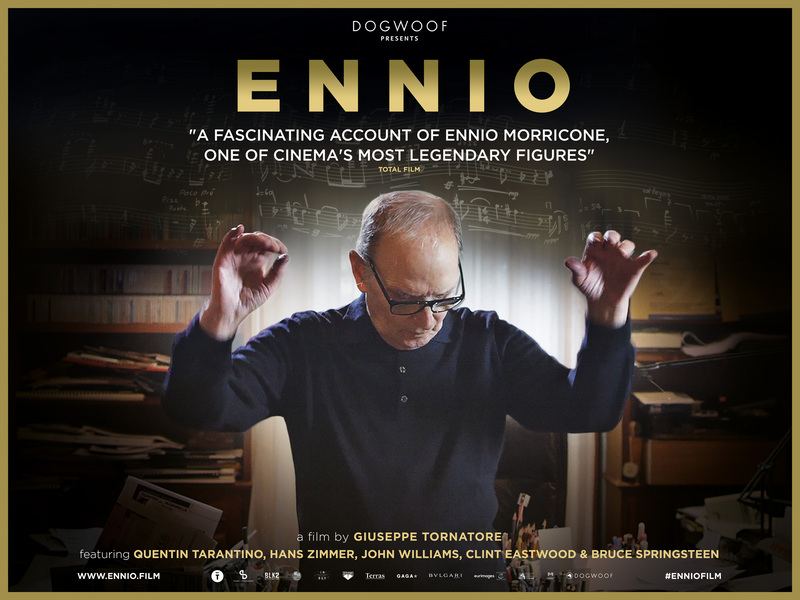
Review by
Eric Hillis
Directed by: Giuseppe Tornatore
Featuring: Ennio Morricone, Giuseppe Tornatore, Quentin Tarantino, Clint Eastwood, Bruce Springsteen,
Hans Zimmer, Dario Argento, Bernardo Bertolucci, Oliver Stone, Quincy
Jones

If a Mount Rushmore should ever be created for film score composers,
Ennio Morricone's face would no doubt be chiselled into the
granite. In terms of working between Europe and Hollywood, in the fields
of arthouse and grindhouse, no other composer has left a legacy with
such a broad range, not to mention his musical contributions to wider
pop culture.
It's with the latter that Giuseppe Tornatore begins his look at
the discography of Morricone in what is perhaps the most insightful
portion of his doc on the composer, who passed away in 2020. Movie buffs
will know Morricone's film work inside out, but outside Italy, his work
in the field of pop music has garnered little attention. In the 1950s
Morricone transformed the sound of Italian pop music by employing the
sort of experimental arrangements and unconventional instrumentation
that would see the likes of Brian Wilson and Paul McCartney lauded the
following decade. Much of what we consider the sound of the '60s can be
traced back to Morricone's work in pop music a decade earlier.

The composer is somewhat dismissive of this period of his career,
though he's largely self-effacing throughout, a perfectionist who
suggests he never quite reached the heights he pushed himself towards.
Movie and music fans would disagree of course, and the first of those
cinematic heights came with his collaboration with Sergio Leone, an old
school friend of Morricone's. Discussing working with Leone, Morricone
is forthright regarding the amount of cross-pollination that occurs in
the field of soundtrack composition. It's now common for composers to
find themselves being asked by directors to replicate a temp track a
scene has been cut to, but this wasn't the norm in the early '60s.
Morricone tells how Leone had cut a key scene in
A Fistful of Dollars to a piece of Dimitri Tiomkin's score
for Rio Bravo and tasked Morricone with essentially coming
up with a piece of music as close to Tiomkin's as possible without
bordering on theft.
The composer is also honest about rehashing his own scores, with some
of his movie work even seeing him draw on his earlier pop tunes. His
self-effacement goes so far as to admit he felt
The Mission would have played perfectly without any music,
despite it becoming one of his most lauded scores.

Ennio runs close to three hours, but with over 400 scores
to his credit, it was never going to be a comprehensive overview of his
work. Fans of Morricone will no doubt scratch their heads at some of the
movies that fail to get so much as a mention, such as his score for John
Carpenter's The Thing, which stands out in his CV by resembling a Carpenter score more than
a Morricone score, or his distinctive donkey braying score for Don
Siegel's Two Mules for Sister Sara. Tornatore betrays a not so subtle bias towards "prestige" cinema,
with lots of time devoted to Morricone's work in lauded arthouse and
award-winning fare, but aside from his collaborations with Leone,
practically no time is devoted to Morricone's work in genre
cinema.
This is quite baffling, as in the early '70s Morricone was as key a
figure in the giallo and poliziotteschi movements as any director. When
we think of black gloved killers and crazy car chases through the
streets of Italian cities, it's Morricone's music that accompanies such
images. It's an omission akin to a John Williams doc that fails to
mention Jaws. There's something ironic about Tornatore's apparent snobbery in this
regard, as the doc heavily posits Morricone as a working class hero
pitted against the elites of the Italian music world.

While such omissions are unforgivable, Tornatore does at least explore
the films he's deemed worthy of inclusion in an interesting and
educational manner. Morricone delivers some fascinating anecdotes, like
how a filmmaker tried to steal a score he was composing for another
director, and how his father, a trumpet player, lost his musical talent,
prompting Morricone to forego adding that instrument in his work until
his father's passing.
Along with a host of talking heads from the movie and music worlds of
both Europe and the US, Tornatore adds some cinematic flourishes,
skillfully editing footage of Morricone conducting an invisible
orchestra in his apartment with clips of his many live performances in
prestigious global venues. Viewers with a limited knowledge of
Morricone's work will likely end up with a notepad filled with movie
titles, but more familiar fans may find Tornatore's film insightful
while also frustrating in its film snob biases.


